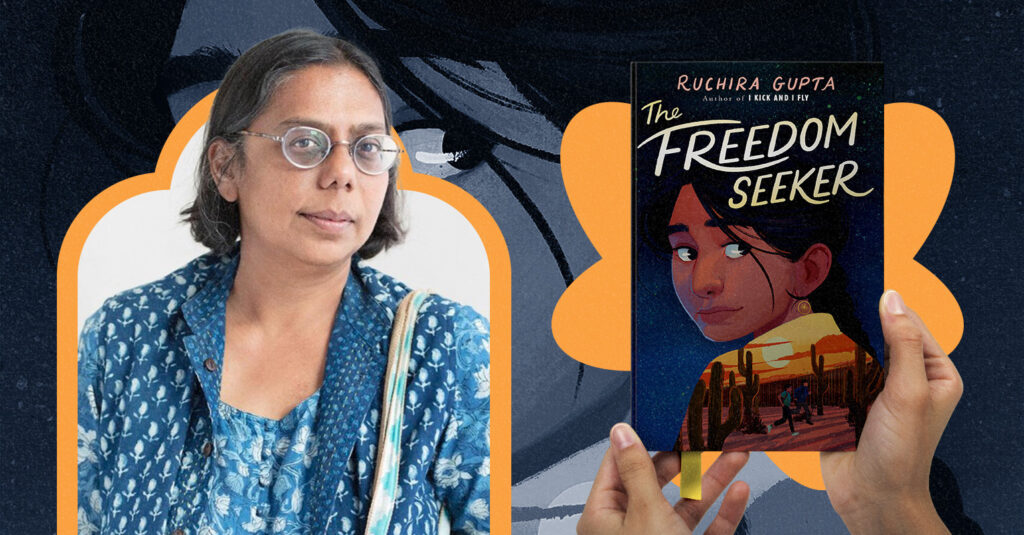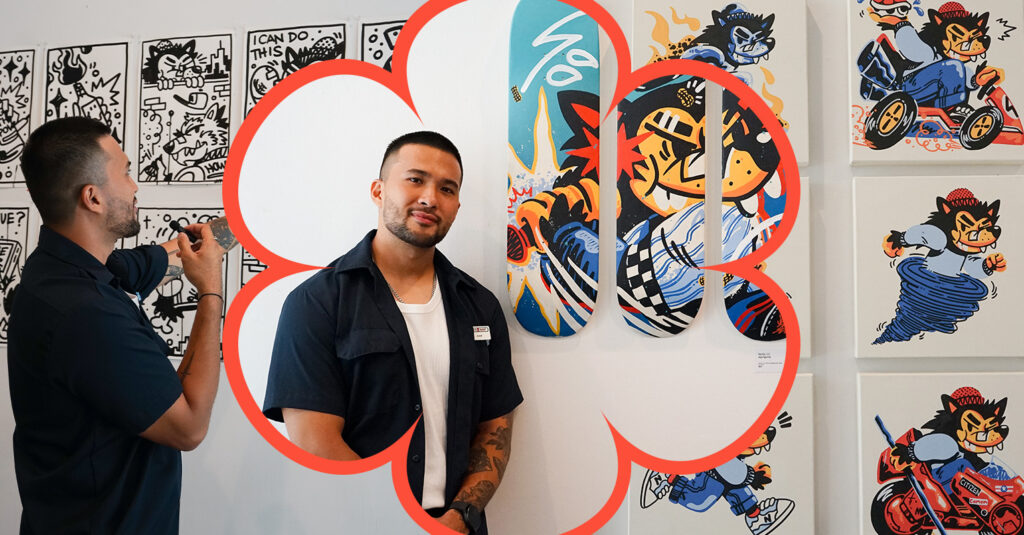Author Spotlight: Humanity Prevails in Ruchira Gupta’s “The Freedom Seeker”

What do you do when it feels like the world is ending?
“Build communities of kindness rather than communities of hate,” says renowned activist and author Ruchira Gupta. “Make decisions based on hope rather than fear. If you plan based on fear, you will shrink your world and go inwards. Ultimately, you’ll go so inwards that your space will be like a prison.”
Ruchira Gupta has done it all. She produced an Emmy award-winning documentary, founded international NGO Aapne Aap, and now, she has written a revolutionary migration story for young audiences.
This past August, Gupta published The Freedom Seeker, a middle-grade novel about a young girl’s perilous migration journey. Through the eyes of 12-year-old Simi Singh, readers experience two things: the struggle of a child forced to fend for herself, and the remarkable capacity humans have to choose kindness.
In commemoration of the United Nations’ International Day of the Girl, EnVi spoke with Gupta about her novel, community organizing, and the urgency of advocating for girls and women across the globe.
Turning Stories Into Solutions
In 1996, Gupta won an Emmy for The Selling of Innocents, her original documentary on sex trafficking in Nepal and India. She stood on stage, statuette in hand for an award that many consider the pinnacle of American and international television. However, as she looked at the audience, their applause filling her ears, it wasn’t their adoring gaze that she saw. Instead, it was the eyes of all the girls and women she encountered in South Asia, whose stories were now documented for all to see, yet were still far from being resolved. It wasn’t enough that Gupta was now an award-winning journalist. She needed to be part of the solution.
“I immediately got off the stage and I turned to [Donna Shalala, former U.S. Secretary of Health], and I said ‘Thank you for giving me the award, but can’t you help me do more?’” Gupta says. “I wanted the government to pay attention to invisible children who are being locked up in cages for no fault of their own. For their traffickers to be punished, and those who buy and sell them.”
With Shalala’s help, Gupta was able to meet notable figures in the Clinton Administration. She successfully advocated for the U.S. Senate to pass the Trafficking Victim Protection Act (TVPA), which Gupta called “the first federal law to shift the blame from the victim to the perpetrator.” However, her work didn’t stop there. Gupta moved on to testify to the United Nations, where she shared her documentary and worked toward the passage of the UN Protocol to Prevent, Suppress and Punish Trafficking.
“[It] became the gold standard law for all countries in the world. Now, about 180 countries have changed their laws to meet that standard,” she says.
Eventually, Gupta returned to Mumbai — where she had originally produced her documentary — and started an NGO with the mothers who told her stories. Together, they started a community classroom, which slowly evolved into a community center that educated both women and children. Through their efforts, more kids enrolled in school and women became better equipped to file cases against traffickers. Now, Apne Aap (meaning “self-action” in Hindi) serves women and girls all over the world, but especially in India. Gupta also continues to advise governments in the UN, along with mentoring students in policy reform.
“I saw how they overcame their fear, the inequality, and the oppression in their lives when given a little bit of help. They had the resilience and the courage to win. I have seen in my life as an activist [that] you can build human connections, and kindness does win,” Gupta says. “Little acts of kindness create this chain, which has a huge impact. As you know, the world is going through a massive migration crisis where people either fear migrants or are attacking migrants. What I’m hoping with my book is that I can help people understand what a migrant really is.”
“The Freedom Seeker” and Radical Compassion
The Freedom Seeker follows the perspective of Simi Singh, a 12-year old girl who migrates away from India with her mother to escape religious vigilantism. In the Arizona desert, the two are separated by human traffickers and Simi must find her way back to safety alone.
The narration is devastatingly rich with sensory and emotional details, thrusting readers headfirst into the young girl’s fear, deprivation, and grief. Through carefully-tailored prose, Gupta also demonstrates that as resilient as Simi is, she is still a child.
However, even in the middle of such a treacherous journey, Simi comes across a number of individuals whose kindness inspires her to persevere — border guards, nurses, teachers, and fellow immigrants and children.
“My book is set against the global rise of intolerance, but it is also set against the great acts of humanity that people are practicing in spite of it all,” Gupta says.
The writing process was anything but ordinary. To put herself in Simi’s shoes, Gupta visited the Arizona border and walked across the desert. At the border, she saw people interacting through the barbed-wire fence, exchanging items like flowers, soda bottles, and food. Then, she trudged through the desert without water, and eventually encountered migrant routes where Christian and Catholic missionaries leave water bottles. Gupta also met nearby townspeople who were providing refuge for migrants by lending their showers, giving them clothes, and feeding them.
“I saw kindness everywhere, in the middle of a system which was not being kind… I thought, let me write a human story rather than the data because ultimately, the world functions and is inhabited by humans. I wanted kids to be able to know that kindness wins, and if they find the courage and resilience, there can be a pathway. I also wanted adults who might be feeling overwhelmed right now to know that small acts of kindness can make a difference,” Gupta says.
The Path Forward
The Freedom Seeker isn’t just about Simi; it’s about the acts of humanity that propel her forward. At the end of the book, Gupta even lists acts of kindness and community projects that young readers can partake in, from standing up for others to organizing a donation drive.
In the face of global struggles like migration, both Gupta and Simi’s journeys teach us that as bad as things may seem, it is crucial to remain hopeful. After all, a better future can only be created when we wholeheartedly believe it is possible.
The very first step, Gupta says, is to build a community strong enough to shake the table.
“Simple truths are the most profound. When we are daunted by big seismic shifts in our lifetime, sometimes we feel nothing can be done. But actually, I have taken on daunting problems like human trafficking when no laws existed, right? I had no skills for it. I didn’t know how to run an NGO. I wasn’t a doctor, lawyer, or a social worker, but I found that by building community, the small acts of kindness create this human chain that tips the balance. Now, we do have laws on trafficking. We don’t use the word ‘prostitution,’ we say sex trafficking. I couldn’t have done it alone. The only way I succeeded was because I reached out to someone, and that someone responded with kindness.”
To learn more about Ruchira Gupta and her work at Apne Aap, be sure to visit her official website and Instagram!
Interested in more stories where creativity meets activism? Check out EnVi’s piece on the UNSEEN exhibition amplifying North Korean women’s voices here!



